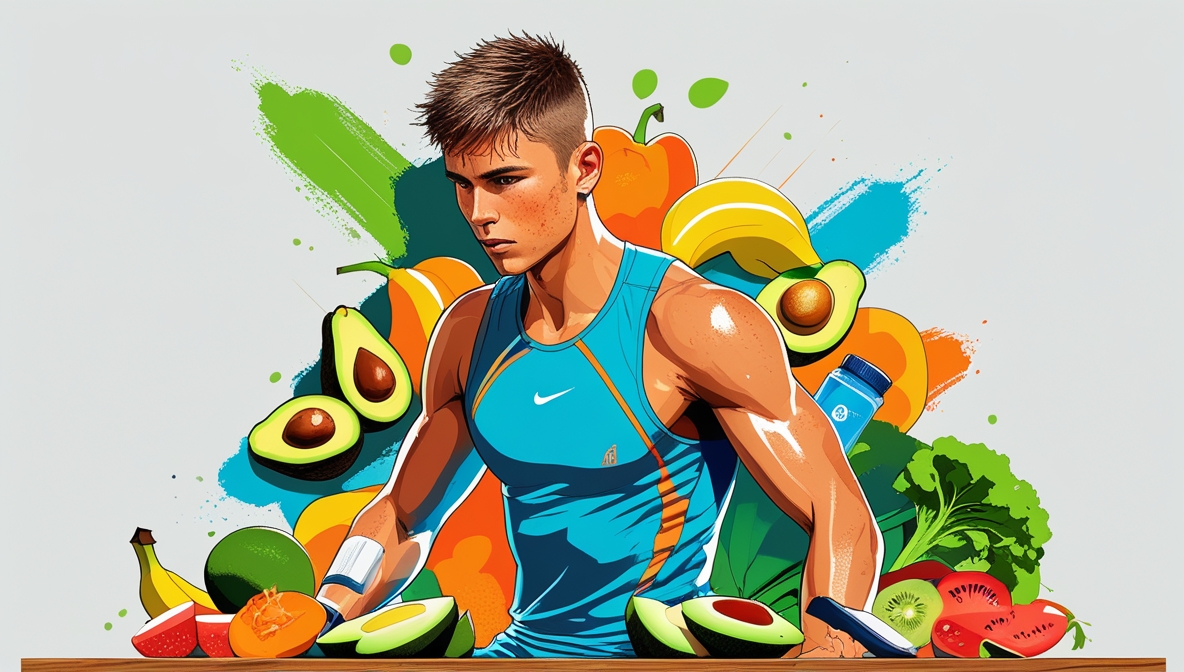Athletes rely on structured nutrition to fuel their bodies for performance, recovery, and endurance. A well-designed meal plan ensures energy levels are sustained, muscles recover efficiently, and peak performance is maintained during training and competition.
Key Components of an Athlete’s Diet
To create an effective meal plan, focus on these essential macronutrients and micronutrients:
1. Carbohydrates
Carbohydrates are the primary energy source for athletes.
- Complex carbs: Whole grains, quinoa, oats, sweet potatoes.
- Fruits: Bananas, apples, berries, oranges.
- Vegetables: Leafy greens, carrots, broccoli.
Aim to consume 3-5 grams of carbohydrates per kilogram of body weight daily for light activity, increasing to 8-12 grams for endurance training.
2. Proteins
Proteins support muscle repair and growth.
- Lean proteins: Chicken, turkey, fish, eggs.
- Plant-based options: Lentils, chickpeas, tofu, tempeh.
- Dairy products: Greek yogurt, low-fat cheese, milk.
Target 1.2-2.0 grams of protein per kilogram of body weight daily, depending on training intensity.
3. Fats
Healthy fats provide long-lasting energy and support hormone production.
- Unsaturated fats: Avocados, nuts, seeds, olive oil.
- Omega-3 sources: Salmon, chia seeds, walnuts.
Fats should make up 20-35% of your total calorie intake.
4. Hydration
Proper hydration regulates body temperature, supports digestion, and prevents fatigue.
- Water: Drink throughout the day and during training.
- Electrolytes: Replenish with sports drinks or coconut water after intense sessions.
5. Micronutrients
- Iron: Boosts oxygen transport (spinach, lean meats).
- Calcium: Strengthens bones (milk, almonds).
- Magnesium and potassium: Aid muscle function and prevent cramps (bananas, nuts, dark chocolate).
Sample Athlete Meal Plan
Here’s a breakdown of a daily meal plan tailored for performance:
Breakfast
- Oatmeal with toppings: 1 cup of oats, almond butter, banana slices, chia seeds, and a drizzle of honey.
- Protein boost: 2 boiled eggs or a protein shake with almond milk and spinach.
- Beverage: Green tea or water.
Mid-Morning Snack
- Fruit and nuts: An apple with a handful of mixed nuts.
- Energy option: Rice cakes topped with avocado and black pepper.
Lunch
- Main: Grilled chicken or salmon with a quinoa salad (add cucumbers, cherry tomatoes, and olive oil).
- Side: Steamed broccoli and sweet potato wedges.
- Drink: Water with a slice of lemon.
Afternoon Snack
- Yogurt bowl: Greek yogurt topped with granola and fresh berries.
- Energy bar: Homemade or low-sugar sports bar.
Dinner
- Main: Lean beef stir-fry with brown rice and mixed vegetables (peppers, carrots, zucchini).
- Side: Leafy green salad with olive oil and balsamic vinegar.
- Drink: Herbal tea or infused water.
Evening Snack (Optional)
- Protein option: Cottage cheese with a sprinkle of cinnamon.
- Carb boost: Whole-grain toast with almond butter.
Timing Matters: Pre- and Post-Workout Meals
Pre-Workout Meal (2-3 Hours Before Exercise)
- Focus: High-carb, moderate-protein, low-fat meal.
- Example: Whole-grain toast with peanut butter and sliced banana, plus water.
Post-Workout Meal (Within 30 Minutes of Exercise)
- Focus: Replenish glycogen stores and repair muscles.
- Example: A smoothie with whey protein, spinach, frozen berries, and almond milk.
Adjusting for Different Goals
For Endurance Athletes
- Increase carbohydrate intake.
- Incorporate carb-loading strategies before competitions.
For Strength Athletes
- Prioritize protein to support muscle growth.
- Add more calorie-dense snacks for energy surplus.
For precision, using a calorie counter can help athletes track daily intake, ensuring energy needs align with training demands and activity levels.
Common Mistakes to Avoid
- Skipping Meals
This can lead to energy depletion, reduced focus, and muscle loss. Stick to consistent meal timing. - Overeating Fatty Foods
Fats slow digestion, so avoid high-fat meals before workouts. - Ignoring Recovery Nutrition
Skipping post-workout meals delays recovery and impacts performance. - Insufficient Hydration
Dehydration reduces endurance and increases the risk of cramps.
Quick Meal Prep Tips
- Batch Cook Proteins: Grill chicken or fish in bulk for the week.
- Prep Snacks: Portion nuts, cut fruits, and make energy bars ahead of time.
- Cook Carbs Ahead: Store cooked quinoa, rice, or pasta for quick meals.
- Hydration on the Go: Keep a water bottle and electrolyte powder handy.
Following a structured meal plan tailored to your sport and goals will help maintain energy, improve recovery, and optimize overall performance.
